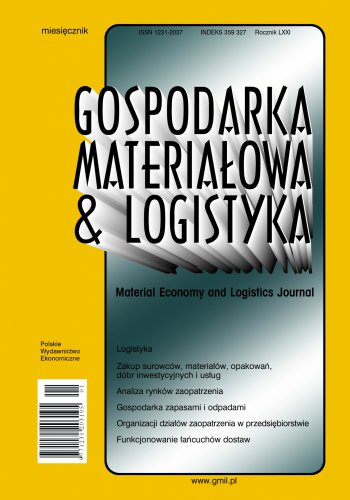The influence of the logistics concept on the logistics projects management performance
Firms are permanently looking for ways leading to the competitive advantage creation. The logistics concept plays a significant role in the process of building such an advantage. Logistics as a concept of flow management, forming business models, strategies and operational programs, uses a number of tools, including logistics projects. Within the management of logistics projects, the projects management performance, related to the flow of materials, goods and information in the project life cycle, plays a significant role.
The aim of the article is to identify the symptoms of the logistics concept impact on the logistics projects management performance.
The article is of a conceptual nature. The first part presents the essence and characteristics of the flow orientation, referring to the research on logistics determinants of business management. The second part of the article presents the basic characteristics of the logistics concept in the context of the relationships between logistics and the management system, the concept of management, management processes as well as management instruments. The third part of the article presents the nature and the most important characteristics of logistics projects, as well as the premises for undertaking research on these projects. The fourth part of the article presents the issues of the logistics projects management performance, as well as refers to the impact of the logistics concept on the logistics projects management performance.
References
Bibliografia/References
Abbasi, A., Jaafari A. (2018). Evolution of Project Management as a Scientific Discipline. Data and Information Management, 2(2), 91–102. https://doi.org/10.2478/dim-2018-0010
Blaik, P. (2009). Nowoczesna koncepcja logistyki jako systemowa determinanta zarządzania przedsiębiorstwem. Gospodarka Materiałowa i Logistyka, (5), 2–9.
Blaik, P. (2015). Efektywność logistyki. Aspekt systemowy i zarządczy. Warszawa: Polskie Wydawnictwo Ekonomiczne.
Blaik, P. (2017). Logistyka. Koncepcja zintegrowanego zarządzania. Warszawa: Polskie Wydawnictwo Ekonomiczne.
Blaik, P., Bruska, A., Kauf, S., Matwiejczuk. R. (2013). Logistyka w systemie zarządzania przedsiębiorstwem. Relacje i kierunki zmian. Warszawa: Polskie Wydawnictwo Ekonomiczne.
Bredin, K., Söderlund, J. (2011). Human Resource Management in Project-Based Organizations: The HR Quadriad Framework. Basingstoke: Palgrave. https://doi.org/10.1007/978-0-230-29751-7
Chaberek, M., Karwacka, G. (2009). Logistyka jako praktyczne urzeczywistnienie prakseologicznych zasad dobrej roboty. Acta Universitatis Nicolai Copernici. Ekonomia Xl — Nauki Humanistyczno-Społeczne, (391), 7–17.
Deepen, J. (2007). Logistics Outsourcing Relationships. Measurements, Antecedents, and Effects of Logistics Outsourcing Performance. Heidelberg: Physica-Verlag, A Springer Company. https://doi.org/10.1007/978-3-7908-1938-0
Dehler, M. (2001). Entwicklungsstand der Logistik. Messung — Determinanten — Erfolgswirkungen. Wiesbaden: DU-Verlag. https://doi.org/10.1007/978-3-663-08467-9_5
Delfmann, W., Dangelmaier, W., Günthner, W., Klaus, P., Overmeyer, L., Rothengatter, W., Weber, J., Zentes, J., Working group of the Scientific Advisory Board of German Logistics Association (BVL) (2010). Towards a science of logistics: cornerstones of a framework of understanding of logistics as an academic discipline. Logistics Research, 2(2), 57–63. https://doi.org/10.1007/s12159-010-0034-5
Drucker, P. (1976). Skuteczne zarządzanie. Warszawa: PWN.
Godenhjelm, S., Lundin, R. A., Sjöblom, S. (2015). Projectification in the Public Sector — The Case of the European Union. International Journal of Managing Projects in Business, 8(2), 324–348. https://doi.org/10.1108/ijmpb-05-2014-0049
Kasperek, M. (2006). Planowanie i organizacja projektów logistycznych. Katowice: Akademia Ekonomiczna w Katowicach.
Kisperska-Moroń, D., Krzyżaniak, S. (red.). (2009). Logistyka. Poznań: Instytut Logistyki i Magazynowania.
Kuura, A. (2011). Policies for Projectification: Support, Avoid or Let It Be? Retrieved from Discussions on Estonian Economic Policy, 117–136, https://papers.ssrn.com/sol3/papers.cfm?abstract_id=1884204 (3.12.2020).
Łapuńka, I., Pisz, I. (2017). Wielowymiarowy i wielopoziomowy kontekst efektywności w zarządzaniu projektami. W: Brandenburg, H., Tobor, G. (red.), Projekty lokalne i regionalne — interesariusze projektu. Katowice: Wydawnictwo Uniwersytetu Ekonomicznego w Katowicach, 213–227.
Matwiejczuk, R. (2014). Kompetencje logistyki w tworzeniu przewagi konkurencyjnej przedsiębiorstwa. Opole: Wydawnictwo Uniwersytetu Opolskiego.
Matwiejczuk, R. (2015). Z badań nad rozwojem koncepcji logistyki w zarządzaniu przedsiębiorstwem. Gospodarka Materiałowa i Logistyka, (10), 30–39.
Matwiejczuk, R. (2018). About the Research Concerning the Relations Between Logistics and Business Management. A Wide Back to the Past and a Brief Look into the Future. Gospodarka Materiałowa i Logistyka, (10), 2–10.
Meredith, J. R. (2002). Developing project management theory for managerial application. The view of a research journal's editor. Proceedings of PMI Research Conference: Frontiers of Project Management Research and Application, Project Management Institute, Newtown Square, 47–53.
Morris, P. (2010). Research and the future of project management. International Journal of Managing Projects in Business, 3(1), 139–146.https://doi.org/10.1108/17538371011014080
Midler, Ch. (1995). Projectification of the Firm — The Renault Case. Scandinavian Journal of Management, 11(4), 363–375. https://doi.org/10.1016/0956-5221(95)00035-t
Packendorff, J., Lindgren, M. (2014). Projectification and its Consequences: Narrow and Broad Conceptualisations. South African Journal of Economic and Management Sciences, (17), 7–21. https://doi.org/10.4102/sajems.v17i1.807
Pisz, I., Łapuńka, I. (2014). Zarządzanie projektami w logistyce. Warszawa: Difin.
Pfohl, H. (1998). Systemy logistyczne. Podstawy organizacji i zarządzania. Poznań: Instytut Logistyki i Magazynowania.
Prockl, G. (2007). Logistik-Management im Spannungsfeld zwischen wissenschaftlicher Erklärung und praktischer Handlung. Wiesbaden: Deutscher Universitäts Verlag/GWV Fachverlage. https://doi.org/10.1007/978-3-8350-5552-0
Sink, D., Tuttle, T. (1989). Planning and measurement in your organization of the future. Norcross: Industrial Engineering and Management Press.
Szołtysek, J. (2015). Pryncypium logistyki. Logistyka, (1), 70–72.
Trocki, M. (2013). Nowoczesne zarządzanie projektami. Warszawa: Polskie Wydawnictwo Ekonomiczne.
Trocki, M. (2019). Podejścia badawcze w zarządzaniu projektami — geneza i ewolucja. Przegląd Organizacji, (3), 3–8. https://doi.org/10.33141/po.2019.03.01
Wirkus, M. (red.). (2013). Zarządzanie projektami i procesami. Teoria i przypadki praktyczne. Warszawa: Difin.
Witkowski, J., Rodawski, B. (2007). Pojęcie i typologia projektów logistycznych. Gospodarka Materiałowa i Logistyka, (3), 2–6.

